AFL hubs set to cost league $60 million as price of keeping 2020 season afloat hits home
The AFL is set to pay a huge price for keeping the season afloat in Queensland, facing a bumper hub bill and costs into the millions for COVID-19 tests.

AFL
Don't miss out on the headlines from AFL. Followed categories will be added to My News.
Melbourne’s second wave of coronavirus has landed a monster blow on the AFL’s balance sheet with the league’s Queensland bill set to blow past $60 million.
Hubs have become houses for Victorian clubs since Round 5 and all 18 teams have spent a chunk of the season living around the Gold Coast and playing home games in Queensland.
That has delivered the league one of the worst-case financial scenarios with hubs costing around $4-5 million to operate every week.
Kayo is your ticket to the 2020 Toyota AFL Premiership Season. Watch every match of every round Live & On-Demand. New to Kayo? Get your 14-day free trial & start streaming instantly >
The league has already spent more than $5 million on COVID-19 tests, with 51,000 conducted and thousands more scheduled in the lead-up to the October 24 Grand Final at the Gabba.
The tests cost about $100 each.
But the remarkable continuation of the season has proved a major success and league boss Gillon McLachlan said Broadbeach residents were stopping him in the street to voice their appreciation.
The AFL has crunched the numbers and worked out that it has paid for more than 101,000 nights spent in Queensland hotels and resorts this season.
They have also paid for more than 400,000 meals for AFL players, officials and their families staying in Queensland and chartered more than 120 flights in and out of the state.
McLachlan said cars and trucks had been rented for almost 10,000 combined days to transport people and equipment around while Queensland bus companies have been booked for 950 trips.
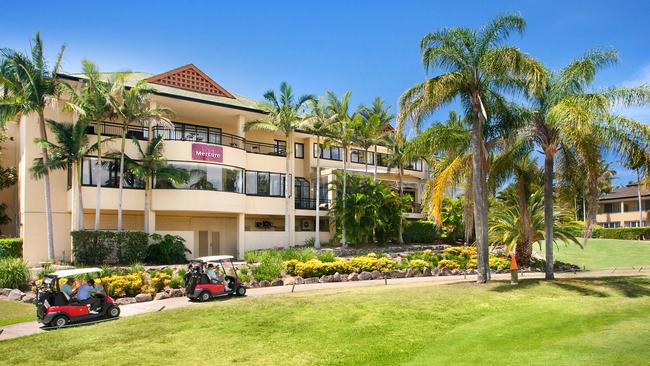
The AFL has also rented 10 gyms, 18 sporting grounds and five recovery centres for the clubs temporarily based in Queensland.
Queensland premier Annastacia Palaszczuk revealed this month that the Grand Final alone would pump $18 million into her state’s economy.
McLachlan said the $60 million spend was on the “outer limit” of this year’s budget estimations when COVID-19 hit.
“We’ve ended up having to use hubs for the vast majority of the season,” he said.
“People talked about 21 weeks (in hubs) and some players are going to get close to that. A number are at 15 now.
“We budgeted for different circumstances, and we got them.”
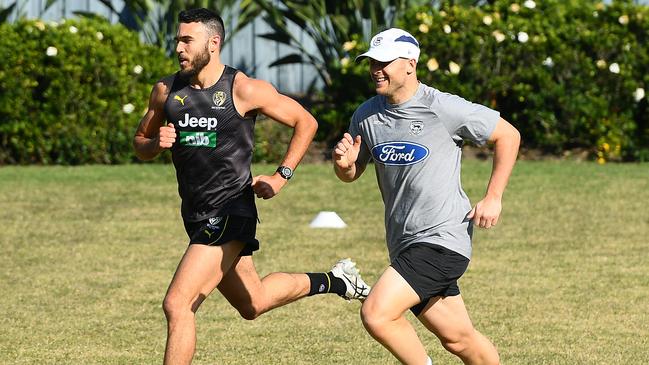
McLachlan confirmed that players have 36 hours to check out of their hubs after their team is eliminated from the premiership race.
They will then be strictly forbidden from seeing players or staff from any club still competing because those people will still be living in the AFL bubble
“The protocols they’ve been living under, they’ll leave those (once they checkout) and won’t be accountable to us for those,” McLachlan said.
“But they’ll be accountable to, clearly, the Queensland community and the Queensland government.
“Those who are staying with families and others are really clear about their accountabilities to the Queensland community, the Queensland government, to our game for their behaviour and then there’ll be accountabilities for those who transgress.”
WHY GILL IS SKIPPING THE AFL BUBBLE
– Sam Landsberger and Nick Wade
Gary Ablett stepped out of the AFL’s quarantine hub and into Geelong’s training session on Tuesday as the Queensland government released league boss Gillon McLachlan’s party of 370 into the Sunshine State.
Ablett, 36, checked out of Gold Coast’s Mercure Resort and headed 20 minutes east to Southport, where he was on the track with the Cats — and wearing the No. 5 made famous by his legendary father — by 10am as they tune up for another finals series.
The champion midfielder, who travelled north with wife Jordan and son Levi, headlined a quarantine hub that was littered with footy heavyweights.

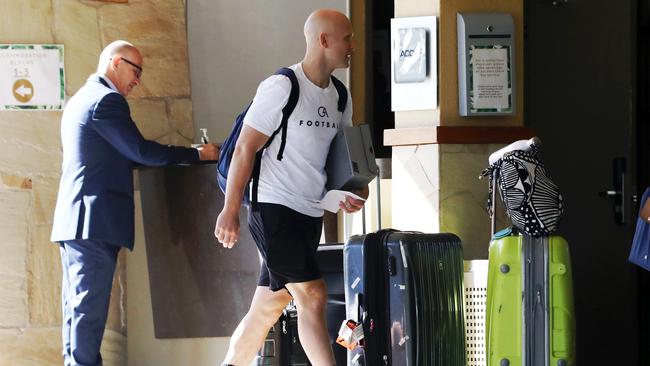
But McLachlan will not join Ablett in the AFL bubble, which all players and club staff have entered into to limit their contact with the outside world.
That will allow McLachlan to meet the Queensland government and other stakeholders face-to-face – instead of over Zoom – leading up to the historic night Grand Final at the Gabba on October 24.
McLachlan will also be free to conduct press conferences.
He is staying on the Gold Coast in Broadbeach near other AFL powerbrokers who are also living outside the bubble.
Richmond superstar Jack Riewoldt reunited with his parents on Tuesday after they exited quarantine while Carlton fan favourite Eddie Betts saw his kids for the first time in 12 weeks.
St Kilda’s quarantine entourage drove north about 220km to join the club’s Noosa hub.
The Saints pack included star midfielder Dan Hannebery, operations assistant Jarryd Roughead, list manager James Gallagher and physio Andrew Wallis.
Geelong is at the Mantra connecting to Southport Sharks Football Club, giving the Cats exclusive access to that ground.
The Cats also have access to a nearby recovery facility although have booked out the Mantra and so families of some coaches will stay at the Mercure.

Geelong had about 70 people in the AFL’s quarantine hub, including chief executive Brian Cook, president Colin Carter, board member James Sutherland and Ablett’s personal coach Andrew Mackie.
Assistants Corey Enright, Nigel Lappin and Matthew Knights along with defender Zach Tuohy all brought up family.
North Melbourne, GWS and West Coast are bunking at the InterContinentental in Sanctuary Cove while Carlton and Western Bulldogs are at RACV Royal Pines, along with the AFL umpires.
The Eagles will return to Perth on Friday to quarantine before the finals series while the 17th-placed Kangaroos have been told they all must checkout by Sunday.
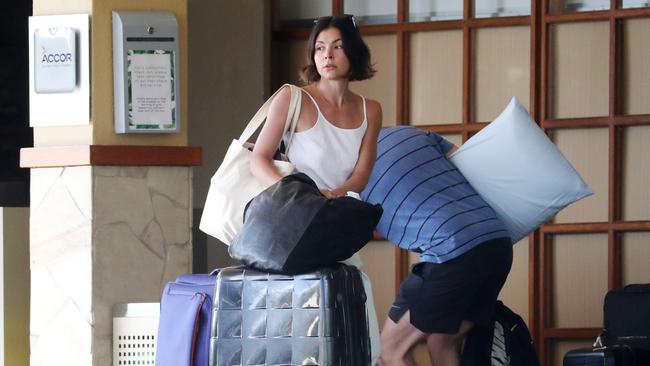
Richmond is split across two hubs with most of its players with families at Royal Pines and most of the single players at KDV Sport.
Another seven AFL clubs are living in hubs outside the Gold Coast.
St Kilda is at Noosa’s RACV Resort while Melbourne, Collingwood, Essendon, as well as NRL club Melbourne Storm, are 30 minutes down the road at Novotel Twin Waters on the Sunshine Coast.

Fremantle and Sydney have shared the Pullman International in Cairns while Hawthorn is in the Barossa Valley in South Australia.
While the Blues have moved house six times the Saints haven’t budged from Noosa and want to stay there for the finals, despite the two-hour drive to the Gabba.
Under the AFL’s protocols players and staff must stay active if they visit the beach and are only allowed to shop for essentials.
They are instructed to get in and out of the shops quickly and clothes, such as runners, are classified as essential if they are required.
We've missed you, Shedda! 🤗@S_Edwards10 was reunited with his teammates today. pic.twitter.com/3D3XqU1mRo
— Richmond FC ðŸ¯ðŸ† (@Richmond_FC) September 15, 2020
Those in the AFL bubble cannot sunbake at the beach and are not permitted to catch Ubers or taxis.
Instead AFL clubs have access to fleet cars, which are only used by those in the bubble.
Coffees and food must be ordered as takeaways because players and staff are banned from sitting in cafes.
The AFL is conducting about 3000 weekly COVID-19 tests each week, with every person in the bubble submitting to two.
The tests cost around $100 each.
VICTORIAN CLUBS LEARN HOME FINALS FATE
– Sam Landsberger
Victorian clubs will be given their choice of three venues for home finals, with that option set to extend through to preliminary final week for Geelong and Richmond.
The Cats and Tigers only need to defeat bottom-four clubs Sydney and Adelaide respectively in Round 18 to lock in the double chance.
If they both win qualifying finals – and secure home preliminary finals – the AFL will ask them whether they want to play for a Grand Final spot at Adelaide Oval, Metricon Stadium or the Gabba.
While the final call will belong with the league, the club’s preference will be strongly considered.
The AFL will on Tuesday lock in its finals policy and structure, which will see week one staged from Thursday, October 1 through to Saturday, October 3.

The league considered opening the finals on a Wednesday night, however has decided to stick with its traditional format.
Either St Kilda, Collingwood, Western Bulldogs or GWS will finish sixth and secure a home elimination final.
That club will also be given the choice of three venues.
The Magpies will play their seventh game for the season at the Gabba next Monday and would be expected to select this year’s Grand Final venue for an elimination final.
The Dogs have played at the Gabba just once and would probably feel more comfortable at Metricon, where they have played eight times this year and won five of their past seven.
The Saints are 2-0 at Adelaide Oval, 2-1 at Metricon and 2-2 at the Gabba, where they play again on Friday night against GWS.
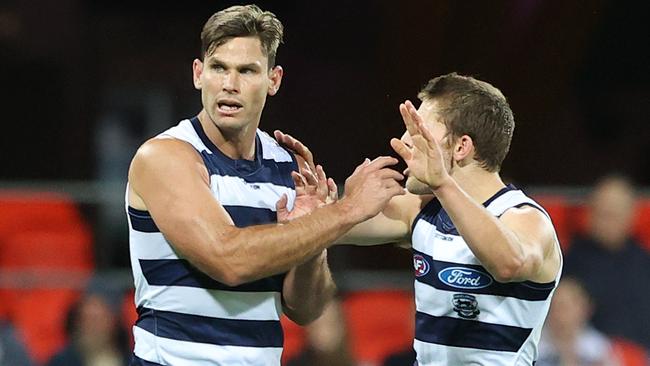
The finals policy will safeguard Geelong and Richmond from playing a home preliminary final against Port Adelaide and Brisbane on their decks.
This year the Tigers are 6-0 at Metricon Stadium and 2-0 at the Gabba, where they haven’t lost since 2004.
The Cats are 2-1 at Metricon and 3-0 at the Gabba.
West Coast can only play at Perth Stadium in week one, meaning the Eagles will only host a final if they remain fifth, as expected.
The Eagles are set to fly home after Thursday night’s game against North Melbourne and would’ve completed the 14-day quarantine by week one of the finals.
If the Eagles finish fifth then the club which finishes eighth will head west and quarantine for seven days before the elimination final, which would most likely be played on the Saturday.
MORE AFL NEWS:
AFL 2020: Dale Morris let go at Bulldogs as staff cuts hit AFL
Hawthorn set to begin construction on new Dingley base
Originally published as AFL hubs set to cost league $60 million as price of keeping 2020 season afloat hits home
